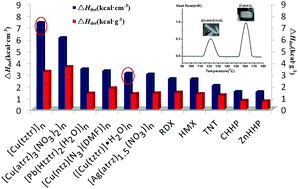A solvent-free dense energetic metal–organic framework (EMOF): to improve stability and energetic performance via in situ microcalorimetry†
Abstract
It is a tremendous challenge to prepare solvent-free dense energetic metal–organic frameworks (EMOFs), hence also to improve their stability and energetic performance. In this study, based on in situ microcalorimetry, an interpenetrating EMOF without solvent molecules, [Cu(tztr)]n (1, H2tztr = 3-(tetrazol-5-yl)triazole) was obtained, possessing high stability (Tdec = 360 °C) and outstanding energetic properties (ΔHdet = 7.53 kcal cm−3, D = 8.429 km s−1, P = 40.02 GPa).



 Please wait while we load your content...
Please wait while we load your content...